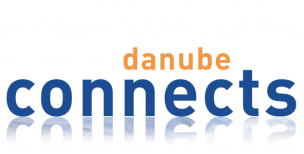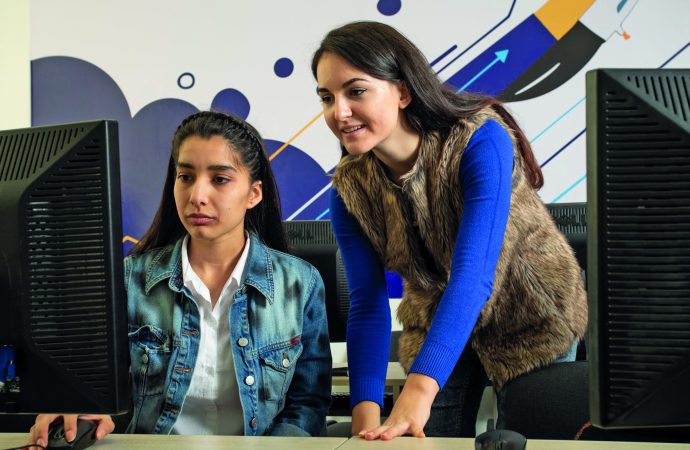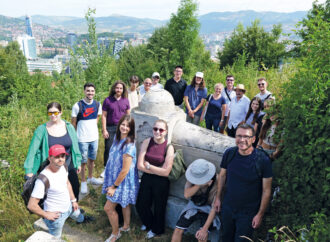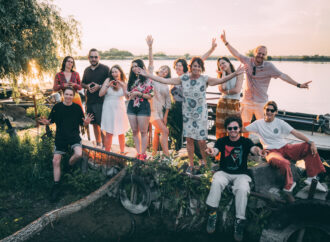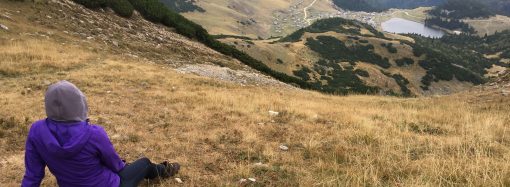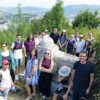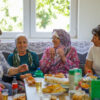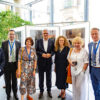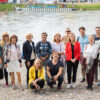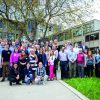Iva Gumnishka: “You can always rely on women” Postcards from Afghanistan and Somalia hang on the wall, Arabic music plays in the background. Kurdish, Dari, Arabic, English and Bulgarian are spoken. A poster stands out: “Homeland destroyed, family gone, former friends became enemies, weeks pass, years of waiting, at the end at least a shelter
Iva Gumnishka: “You can always rely on women”
Postcards from Afghanistan and Somalia hang on the wall, Arabic music plays in the background. Kurdish, Dari, Arabic, English and Bulgarian are spoken. A poster stands out: “Homeland destroyed, family gone, former friends became enemies, weeks pass, years of waiting, at the end at least a shelter – and the will to start all over again, in an unknown country. It takes courage to be a refugee.” Next to it is a white plaque with several forms of the word “go” in Bulgarian.
In a small room of perhaps four by four metres, eight people sit close to their laptops. An orchestra of keystrokes and mouse clicks. This is what it looked like a year ago when I visited the small premises of “Humans in the Loop” in Sofia. “Humans in the Loop” is a social company that mainly employs refugees and places great value on the fact that women can also work. Iva Gumnishka founded the company in 2017.
Iva, we met a year ago in your small premises in the building of the Red Cross in Bulgaria. You were only there for a while. Have you found anything of your own in the meantime?
Iva Gumniska: Well, I must admit, with the square meters we did not grow much more, we now have something roughly over 30 square meters, but they are our square meters, our office. We try to use our resources sparingly and above all to invest in the further education of people.
We now have two rooms: one for the training courses that we offer, such as web design, programming, image editing, general computer courses or Bulgarian and English. The other half is our – as I call it – headquarters (laughs), where we manage the projects with three people full-time and two part-time. We work in the field of data processing and correction for machine vision and object marking.
How did you come up with the idea to found this company?
I studied human rights in the USA. The four years that I spent there overlapped exactly with the influx of refugees to Europe. In my thesis I dealt with the topic of labour law for refugees – and I wanted to put this into practice. I didn’t want to watch from a distance, I wanted to do something. I had the opportunity to extend my USA visa by one year, but that was out of the question for me. I wanted to go home and do something in the humanitarian field, make a difference. At my university, most people thought that if you didn’t make money after graduation, you would have failed in life. But I also feel successful like this – I started this company from scratch and so far we haven’t gone bannkrupt, which is a good sign.
Who attends your courses and who works on your projects?
We work with people from conflict regions, they come from Syria, Afghanistan, Pakistan and Yemen. We have young students, but also middle-aged people, who would otherwise have no other opportunity on the Bulgarian job market, we have people with university education and without. Over 60 per cent are women. Most of them work from home and this is a good opportunity, especially for the women, as it offers flexibility. The aim is for the refugees to earn their own money and use this activity as a stepping stone into the world of work – or simply earn some extra cash while studying.
How does this affect women, their integration into society, which is initially foreign to them, and into the world of work?
You can always rely on women. They are our “top performers”, they are more motivated. It is a win-win situation. We give them responsible tasks, integrate them into different projects, and on the other hand working from home is a possibility for the women to juggle family and work. And for them it is also very important to earn their own money and contribute to the family finances.
In Bulgaria, the rate of women in employment is high compared to the rest of the EU. The technology sector in particular employs a large number of women. Bulgaria is even the leader in the information, communication and technology sector – with the largest proportion of women (26.6 percent) in the EU countries. Far ahead of Germany, which has a 16.6 percent share of women. How do you explain this?
In Bulgaria it is less socially accepted if women stay at home and are housewives. In the USA, where I lived, it is rather accepted. In Bulgaria before 1989, women were full members of the world of work. There is this tradition and there are role models for women in technological professions. There is also the assumption that all education would have been in vain if the woman just stayed at home. And then there is the reality: Bulgarian families depend on both parents earning money. In countries with higher wage levels, it may be easier for one of them not to work – and most of the time, that’s the woman.
What administrative hurdles did you face when you founded the company?
I thought a lot about the type of company I should register. We had two options: as a non-governmental organisation, but then you depend on outside financing and sponsoring. The other option was to work as a regular company and offer people the opportunity to actually earn money with their work. In Bulgaria there is no legal form for a social enterprise. That is why we have registered as a company and imposed social principles on ourselves. For example, one of them is that our social commitment is equal to our business objectives.
For two years now you have been leading “Humanity in the Loop”. How have you changed during this time?
I have become less idealistic. I no longer idealize the humanitarian field as I did at the beginning. What I mean by this is that a person who is just entering the humanitarian non-governmental sector comes with many ideals and hopes to change the world and the living conditions of people. But if you work long enough with a group of affected people, as in my case with refugees, then you stop seeing them as needy, but rather as people with their own strengths and weaknesses. I see them as equal employees, and we focus on their motivation, on their future here, on their development, less on their past.
What is the future for Humans in the Loop?
We currently have around 100 people working for us, and we have built up a stable network. Our next goal is to award more contracts to people in their regions and countries of origin. For example, we cooperate with companies in Syria and try to find employment there for people directly in the crisis regions, as well as offering them courses in information technology.
Rayna Breuer,
journalist, Bonn
